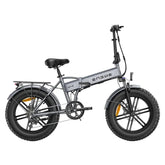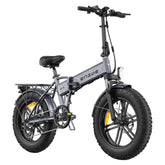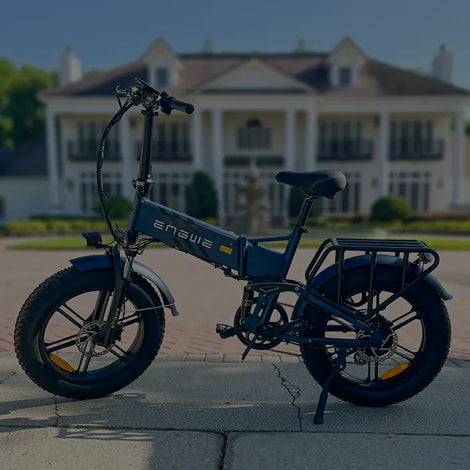In today's financially-conscious world, every opportunity for savings matters. Embracing e-bikes offers not just a mode of transportation but also unlocks significant E-bike Financial Savings. By choosing e-bikes over traditional automobiles, individuals can pave the way for a secure financial future while promoting sustainability.
E-Bike Financial Savings
If you are working towards building a financial plan, an e-bike is an effective technique you need to apply. Given that you are not travelling by automobile, you can conserve money on transport costs. Below are ways e-bikes can raise your cost savings.
Commuting Efficiency and Cost Savings
You can conserve up to $6 daily by commuting with e-bikes. You can also save much better than commuting by public transport. It assists you to save and designate part of your earnings to other expenditures.
Maintenance Savings and Hassle-Free Riding
If you are riding the chain-free version of an e-bike, you will certainly not need to worry about the oil application. You might obtain a chainfree electric bike from Honbike, which does not trigger regular damage. The operating expense of a car is fairly high, which is relatively minor in e-bikes. The frequent rubbing from chain bikes usually results in substantial fixing expenses. Hence, this will affect the possibilities of conserving a huge amount from e-bikes.
Strategic Route Planning for Time and Productivity
Riders should also seek to intend their route in advance of the day. It helps you to conserve time and likewise be more productive. Meanwhile, performance produces larger revenue in firms and organizations. This is much more certain to company owner that greatly rely on daily profits.
Reduced Parking Costs
Since ebikes are portable and flexible, you are much less worried regarding battling for parking space. You can park it in your work space, given you are not damaging the regulations. Therefore, you will certainly not require to pay for the massive costs charged in car park.
Car Insurance Premiums
Many European states do not mandate e-bike riders to have insurance coverage. Thus, this saves you from relevant costs like car loans. Nonetheless, some countries may request certain verification proof, however it is not as stringent as the automobile insurance process.
Recreation Benefits
Individuals remain curious about leisure tasks in spite of the high gas fee in Germany and many various other European nations. This saves the possible costs sustained from entertainment centers. It allows people to check out areas while having a good time with plugged-in songs. You can conveniently save on your own from paying enormous health club subscriptions. Health and fitness has ended up being required in culture, so involve your body muscles while riding an e-bike. E-bikes aid to maintain the body in shape and reduce the risk of creating obesity and type-2 diabetic issues.
Health Benefits
Electric bikes supply numerous health and wellness benefits, thus lowering the need for clinical costs. Riding regularly will aid to improve cardio activities and advertise mental health and wellness. Individuals who pay for substantial therapy sessions can also attempt riding e-bikes, also if it's just for the evening. With the surge in gas charges, you want to keep away from the automobile, which is not also a healthy and balanced mode of transportation.
Evaluating Transportation Expenditures
As geopolitical tensions persist, allocating a significant portion of one's income towards gasoline expenses appears increasingly imprudent. The relentless demand for gas coupled with potential supply shortages necessitates a shift towards more sustainable transportation options. Embracing e-bikes not only conserves natural resources but also offers savings in both time and cost, presenting a viable alternative amidst escalating fuel prices.
Impact of Rising Gas Prices
The recent surge in gas prices, particularly pronounced in European nations like Germany, has placed significant strain on household budgets and national economies. Germany, in particular, faces economic challenges due to gas supply inadequacies, exacerbating concerns about heating during the approaching colder months. With Russia showing little willingness to provide assistance, the urgency to address this energy crisis grows more pressing by the day.
Cost Analysis of Transportation Modes
In Germany, transportation costs vary depending on the mode chosen, with taxis and public transportation constituting significant expenses for commuters. While local public transportation typically incurs an average cost of EUR2.00 per single ticket, monthly passes offer a more economical option for regular commuters. Additionally, taxi fares, averaging around EUR3.50 for a base charge in Berlin, contribute to overall transportation expenditures. Amidst escalating fuel prices, the allure of electrically powered transportation modes becomes increasingly appealing, promising long-term cost savings and reduced dependency on external energy sources.
E-bike Financial Savings: The Affordability of E-bikes
E-bikes have emerged as a cost-effective solution for individuals seeking to mitigate daily travel expenses. With a modest upfront investment and minimal maintenance requirements, e-bikes offer an attractive alternative to traditional bicycles and gasoline-powered vehicles. Models like the Engwe EP-2 Pro provide riders with a maintenance-free riding experience for up to 10,000 kilometers, facilitating affordable and sustainable transportation solutions for consumers. As Europeans prioritize cost-effective commuting options, the popularity of e-bikes continues to rise, offering a compelling solution to mitigate transportation expenses in the long run.
Gas Expenses and Transportation Trends
In light of increasing gas prices, transportation habits in Germany and Europe are undergoing significant shifts. Despite the challenges posed by rising fuel costs, everyday activities such as commuting to work, shopping, and attending events persist. However, the burden of transportation expenses weighs heavily on individuals and households, prompting a search for more cost-effective alternatives.
Impact of Rising Gas Prices
The recent surge in gas prices, exacerbated by factors such as the Russia-Ukraine conflict and the lingering effects of the COVID-19 pandemic, has led Europeans to seek ways to reduce their fuel expenses. With gas prices hitting record highs, consumers are facing increased financial strain, particularly as energy costs constitute a significant portion of household budgets. This has prompted a growing interest in alternative modes of transportation that offer savings on fuel expenditure.
Shift Towards Electric Bikes
In response to escalating fuel costs, there has been a noticeable trend towards the adoption of electric bikes (e-bikes) as a viable means of transportation. E-bikes, such as the Engwe EP-2 Pro and Shengmilo MX03, offer a cost-effective alternative to traditional automobiles. With prices ranging from EUR999,00 to EUR1,349,00, e-bikes eliminate the need for gasoline by operating on battery power. Not only are they more economical in terms of annual expenses compared to conventional vehicles, but they also present a more sustainable and energy-efficient mode of transport.
Addressing Energy Crisis and Future Considerations
As Germany endeavors to slash gas consumption by 20% amid the energy crisis, deliberations arise regarding reliance on external fuel sources. German Vice Chancellor Robert Habeck highlights potential economic impacts and potential price hikes. The looming prospect of sourcing gas from other European countries and the United States raises concerns, impacting industries dependent on gas for production. Amid these challenges, transportation and energy consumption undergo a significant shift, emphasizing the importance of proactive measures to adapt and capitalize on E-bike Financial Savings.













